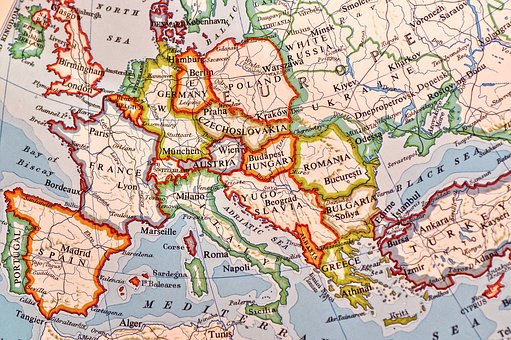「国」|「country」「nation」「state」「land」の使い分け
日本語の「国」は英語では country, nation, state, land などの語を使い分ける。
それぞれ表すニュアンスが違うので覚えておこう。
「国」|「country」は政府の存在する国家、国土
「country」は地理的な国土としての国、政府の存在する国家や国土をさしていうときに使う。
出身国を聞くときによく使う表現は、
What is your native country?
「あなたのお国はどちらですか」
※ native country のかわりに mother country, home country も使える。
おとぎ話に次のような一節がありそう。
Bowing to fate, the princess went in marriage to the neighboring country.
「王女は、運命とあきらめ隣の国へ嫁いで行った」
※ bow to fate 「運命とあきらめる」
「国」|「nation」は歴史的共同体としての国
「nation」は歴史的共同体としての国民からなる国。その国民や歴史的、社会的状況に焦点を当てるときの語。
アメリカの独立宣言は1776年のことで、その歴史はまだ短い。
The United States has a shorter history as a nation than major European countries.
「米国はヨーロッパの主要国に比べ、国家としての歴史が浅い」
かつて、こんな国もあった。
The nation was branded as an aggressor.
「その国は侵略者の烙印(らくいん)を押された」
※ aggressor 「侵略者」
「国」|「state」は法律的、政治的な概念としての国家
「state」は独自の政治概念を持つ組織をさしていうときに使う語。アメリカで the state は州のことをいう。
Many industries were under state control during the war.
「戦時中、多くの産業は国家の管理下にありました」
Once there were many ambitious young patriots in the Meiji Restoration period who aimed at establishing a new state. Sakamoto Ryoma was contemporary with them.
「かつて新国家の建設をめざした、維新の若い志士たちが多くいた。坂本竜馬は彼らと同時代の人だった」
They can turn right even on a red light in some states in America.
「アメリカの一部の州では赤信号でも右折できる」
「国」|「land」は文語、詩で使われる。
「land」は文語や詩で「国」を表すときに使われる語。
Prevented by war from returning to their native land, they are forced to stay on in a foreign country.
「戦争で故国に帰ることができず、彼らは異国にずっと足留めされている」
He went overseas to spread Christianity in heathen lands.
「彼は異教の地にキリスト教を広めるべく、海を渡っていった」
※ heathen 「異教徒」










